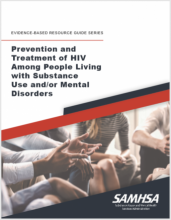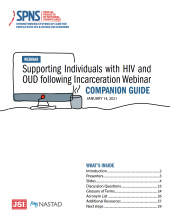
This resource describes how state health departments and other public health organizations can partner with people with HIV and/or who use(d) drugs in programmatic and policy making processes and evaluation.



This resource describes how state health departments and other public health organizations can partner with people with HIV and/or who use(d) drugs in programmatic and policy making processes and evaluation.
This guide offers considerations for how state agency staff can develop and maintain an accessible, HIV and opioid use disorder (OUD) service inventory. This guide can be used by state agency HIV and OUD staff to:
Individuals who have HIV who also use drugs experience increased age-matched morbidity and mortality in comparison with those with HIV who do not use drugs.
This tool aims to assist HIV primary care teams that work in a range of clinical settings to develop and provide enhanced integration of behavioral health (BH) services.
This discussion guide is intended to elicit a comprehensive and concrete conversation about language, stigma, and discrimination as a means of strengthening care systems and ensuring that people who seek care for HIV and/or substance use disorders, including opioid use disorder, are treated with
In May, the New England AIDS Education Training Center (NEAETC) published a set of pages dedicated to providing information about and resources for HIV and HIV-related topics.
This document provides a quick overview of the federal discretionary funding programs that support essential aspects of the nation’s HIV response.
Achieving the goals of the Ending the HIV Epidemic (EHE) Initiative depends on doing more to strengthen communities, reduce the harm associated with drug use, and prevent disease transmission.
This webinar companion guide provides information for the January 2021 Strengthening Systems of Care: Supporting People with HIV and Opioid Use Disorder following Incarceration webinar.